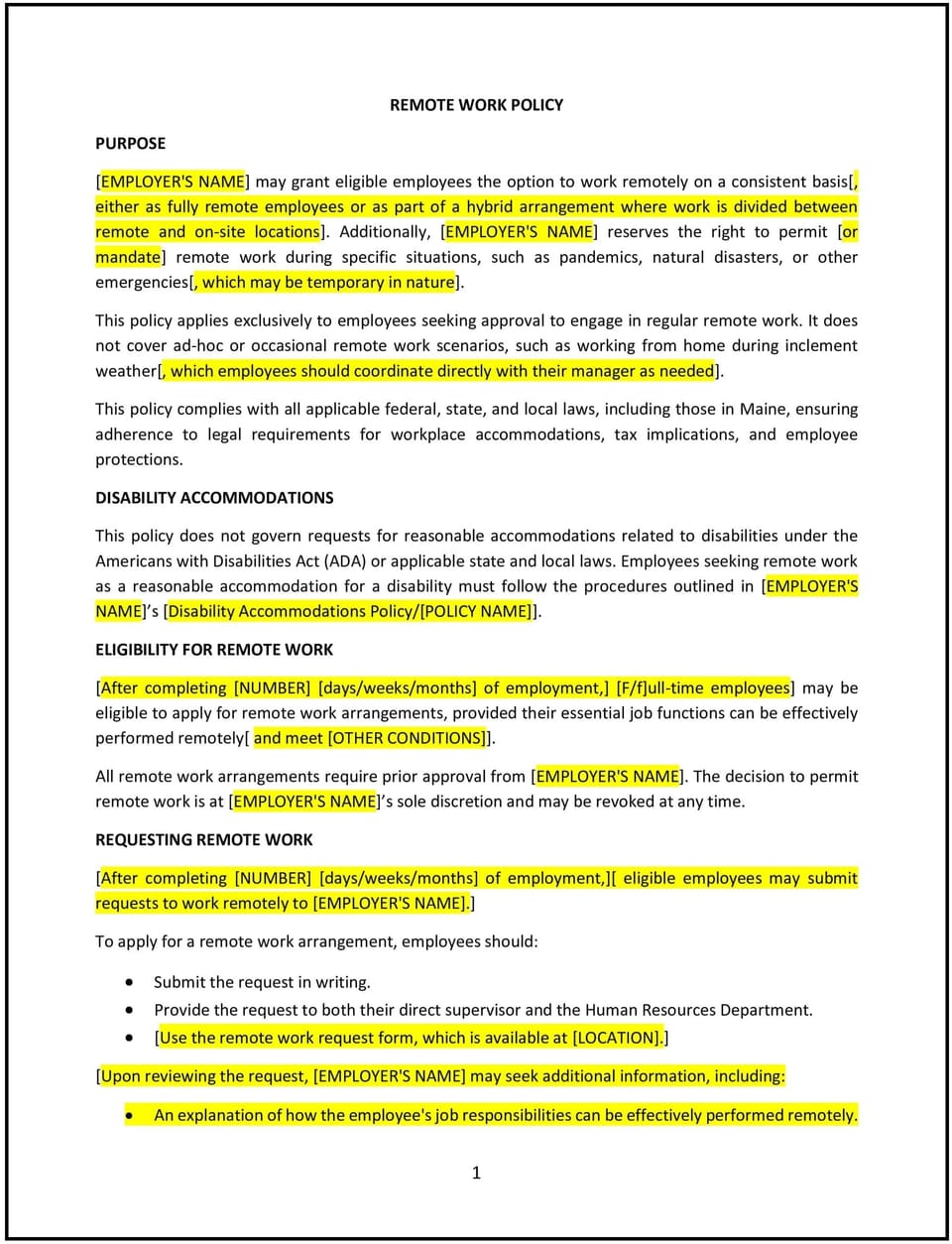Remote work policy (Maine): Free template

Remote work policy (Maine): Free template
This remote work policy is designed to help Maine businesses manage employees working remotely, ensuring that productivity, communication, and performance standards are maintained. It outlines the expectations, requirements, and guidelines for employees who work from home or other remote locations.
By implementing this policy, Maine businesses can provide flexibility to employees while ensuring that remote work does not impact the overall effectiveness or efficiency of the business.
How to use this remote work policy (Maine)
- Define eligibility: Specify which employees are eligible for remote work, whether it's full-time, part-time, or on a flexible schedule, and outline any criteria for determining eligibility (e.g., job function, performance history).
- Set expectations for work hours: Outline the expected work hours for remote employees, including core hours (if any) during which employees should be available for meetings and communication.
- Address communication and collaboration: Establish clear guidelines for how remote employees should communicate with managers and team members, including the use of email, video conferencing, and project management tools.
- Set productivity and performance standards: Specify the performance metrics or goals for remote employees, ensuring that they understand how their productivity will be assessed, and that the standards are aligned with those in the office.
- Provide guidelines for remote work equipment: Clarify what equipment (e.g., computers, software, phone systems) is provided by the company, and outline any responsibilities employees have for maintaining their remote work setup.
- Ensure data security: Specify guidelines for maintaining the confidentiality and security of company data when working remotely, such as using secure Wi-Fi networks, implementing VPNs, and following data protection policies.
- Include safety guidelines: Remind employees that they are responsible for maintaining a safe and suitable work environment at home and that the business may conduct periodic safety checks.
- Review regularly: Update the policy periodically to reflect changes in business practices, technology, or legal requirements related to remote work.
Benefits of using this remote work policy (Maine)
Implementing this policy provides several benefits for Maine businesses:
- Enhances flexibility: Allows businesses to offer employees greater flexibility, improving job satisfaction and work-life balance.
- Maintains productivity: Sets clear expectations for remote work, ensuring that employees remain focused and aligned with company goals.
- Ensures communication: Provides a framework for maintaining strong communication and collaboration between remote employees and the rest of the team.
- Reduces overhead: Helps businesses save on overhead costs by reducing the need for office space and related expenses.
- Supports business continuity: Enables businesses to continue operations during unexpected events, such as weather emergencies or public health crises, by facilitating remote work options.
Tips for using this remote work policy (Maine)
- Communicate expectations clearly: Ensure that employees understand their responsibilities and how their work performance will be monitored and evaluated while working remotely.
- Provide the necessary tools: Make sure remote employees have access to the tools and resources they need, such as computers, software, and communication platforms, to be effective in their roles.
- Encourage regular check-ins: Schedule regular one-on-one meetings between remote employees and their managers to discuss progress, challenges, and feedback.
- Maintain a balance: Be flexible in accommodating personal needs while ensuring that work performance remains consistent with in-office standards.
- Ensure security protocols: Provide training on cybersecurity and enforce protocols like VPNs and password management to protect company data when working remotely.
- Review feedback: Regularly solicit feedback from remote employees to identify any challenges they may be facing and to improve the remote work experience.
Q: Who is eligible for remote work under this policy?
A: Eligibility for remote work depends on the employee’s job function, performance history, and business needs. Eligibility may be determined on a case-by-case basis.
Q: What are the expected work hours for remote employees?
A: Remote employees are generally expected to work during the standard business hours, with any necessary flexibility depending on the role or agreement. Core hours may be set for team collaboration.
Q: How can employees ensure the security of company data while working remotely?
A: Employees should use secure Wi-Fi, a company-provided VPN, and follow company data security guidelines to protect sensitive company information.
Q: How often should businesses review their remote work policy?
A: Businesses should review the policy annually or whenever there are updates to relevant laws, business practices, or technological tools that affect remote work.
This article contains general legal information and does not contain legal advice. Cobrief is not a law firm or a substitute for an attorney or law firm. The law is complex and changes often. For legal advice, please ask a lawyer.


